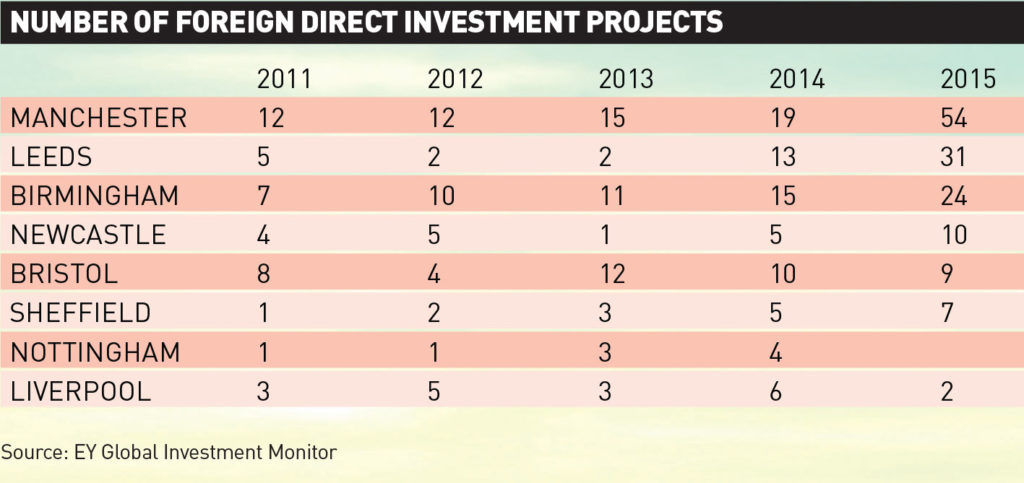The UK has had a record-breaking two-and-a-half years of attracting foreign investors to its shores. In 2015 its slice of foreign investment grew to 20%, making it the leader of the pack in Europe.
Powering this national success has been a fundamental shift in investment patterns, with 90% of foreign direct investment growth now coming from the regions and cities outside London and the South East.
While London remains a dominant force, its UK market share of FDI projects has dropped from 47% in 2013 to 38% last year, according to EY’s Global Investment Monitor. In contrast, core cities Manchester, Leeds and Birmingham have surged ahead.
The consultancy reports a whopping 184% increase in projects in Manchester and 138% for Leeds, while Birmingham, Newcastle and Sheffield have seen their best FDI results for a decade (see table).

Regional cities have seen an increase across all areas of FDI activity, including capital investment, development partnerships and the expansion of existing investments.
Notable investors include Canada Pension Plan Investment Board, which part-funded 6 Wellington Place in Leeds and has gone on to take a 50% stake in the first £150m phase of the £1bn Paradise development in Birmingham.
Chinese property developer Country Garden has also signed a deal with Birmingham city region to build homes and “explore” investment opportunities around HS2. The agreement, signed in September, could be worth up to £2bn. Details are yet to be worked out, but it is significant as a means of tying the developer into the city.
EY chief economist Mark Gregory points to devolution as a key factor in the FDI shift to the regions. In its annual survey of global investors, 42% said that giving the regions local decision-making powers made them more attractive.
“It seems that devolution is starting to work and foreign investors are helping to rebalance economic activity more evenly across the country,” Gregory says.
Neil Rami, chief executive of Marketing Birmingham, which leads on inward investment for the city, agrees that changes in local structures have made a huge difference to cities.
“The introduction of local enterprise partnerships has led to much greater collaboration, with all the local authority chiefs prioritising FDI,” he says. “We have seen a much more aligned national effort from UKTI, now the Department for International Trade.”
But he adds that overheated pricing in London as well as a renaissance in regional cities have also boosted foreign investment. “There has been huge investment in infrastructure in the past 20 years, which has helped our capacity to grow and made cities much more attractive to investors,” he says.
Manchester has been the leading recipient in foreign investment outside London for the past nine years. The number of projects it attracted rose from 19 in 2014 to 54 in 2015. The city has had its own devolutionary structures in place for 30 years and is the first and (so far) only city to have negotiated the transfer of more than £6bn in health and social care spending (from this April).
This and its long-standing structures give the city the scale to be able to attract major overseas investors, says Tim Newns, chief executive of inward investment agency MIDAS.
“The whole of Greater Manchester has been focused on attracting foreign investment through one single organisation for more than a decade. Others haven’t had that consistency of approach.”
He adds that the city region’s balanced policy, aimed at attracting investors from four sectors – financial and professional services; digital, media and technology; life sciences and health; and advanced manufacturing – means it has not suffered the economic fluctuations in investment seen in other cities.
This approach, as well as a strong market focus, is also shared by Birmingham and Leeds. All three are targeting US investors, which for Birmingham account for around a third (32%) of its foreign investment. Manchester is also concentrating on China and Japan, and Leeds has its eye on London and Europe.
But it is not just an international focus that has enabled these cities to expand their FDI. All three are developing rapidly to attract major domestic investors.
According to the Deloitte 2016 Crane survey, Manchester has 1.4m sq ft of grade-A office development under construction, with the number of new starts up by 40% since 2014. In Leeds, office construction is at its highest since 2007 and in Birmingham since 2003.
David Shepherd, head of trade and investment at Leeds City Region, says expanding the city has led to UK companies choosing to relocate or expand in Leeds, which in turn has helped overseas firms do the same.
“Both PwC and KPMG have made public statements by choosing brand-new buildings in the city and we have since seen Hitachi Capital treble its financial services operation.”
Manchester and Birmingham have also taken more advantage of their locations, with both expanding international routes through their airports. Manchester has added 14 new routes to all major US cities, says Newns, and several to China. Birmingham has added 22 in the past 18 months.
“The centrality of our location was something we hadn’t really capitalised on before,” says Rami.
They also tend to take a “trickle” approach to getting investors in, starting with small projects, then helping the investors to increase their presence over time.
“Many of our professional services investors come in a modest way,” says Rami. “They test the market and the skills, see if they can build a supply chain, come in with back office and then end up with front office.”
Newns points to German diagnostic company Qiagen, which came to the city in 2009 and has since transferred its global R&D from Germany and the US to Manchester. US firm Hologic, which develops surgical products, has also moved its internal operations from the US to Manchester, including product development and distribution to its markets in China and India.
But while these cities are bullish about their success, there is a spectre hanging over FDI in the UK: Brexit.
RICS, in its second-quarter commercial property market survey, reported a 27% drop in “foreign investor demand” across the UK and an overall decline in investment enquiries.
Rami says the referendum has not yet had a detrimental effect but expects Birmingham will have to become more proactive. And Shepherd describes the EU referendum result as a “huge challenge” for cities.
“We will adapt our strategy. For example, it may no longer be appropriate to go into Europe doing loads of lead generation,” he says, adding that investors are already voicing concerns about taxation and tariffs. He believes that “no assurances can be given yet”.
“It’s wait and see,” he adds. “We need to be consistent and make sure we emphasise the need to have good relationships with the investors that are here.”
Foreign investment floods into Leeds
Of all the cities in EY’s Global Investment Monitor, Leeds has shown the fastest growth in FDI activity. In 2012 and 2013 it managed to attract just two FDI projects in each year. By 2015 there were 31 in the city, pushing it into second place in EY’s GIM league.
David Shepherd, head of trade and investment at Leeds City Region, says it has had a period of quiet reflection, undertaking detailed research on potential growth areas.
He says the city now takes a more “thought-led approach”, which means that it does not “spread its net as wide” as other cities. At the same time there is a stronger focus on four sectors – financial and professional, healthcare and life sciences, digital and creative, and advanced manufacturing – that has helped develop a clearer message to potential investors.
He adds that the private sector plays a crucial part in the city’s marketing, including to existing overseas investors such as Hitachi Capital.
The city also benefits from HS2, which was one of the main reasons a Singaporean-consortium led by Heeton Holdings last year bought Bridge Street, a 1m sq ft mixed-use development site in the centre of Leeds. The once-stalled scheme was the consortium’s first purchase outside London.
Shepherd says that the opening up of Leeds’ South Bank, where the HS2 station will be located, including the Holbeck development site, gives the city a huge amount of land to attract inward and overseas investors.
But there are concerns that the city will struggle to meet demand from existing occupiers in the city with agents reporting that demand still exceeds supply.











